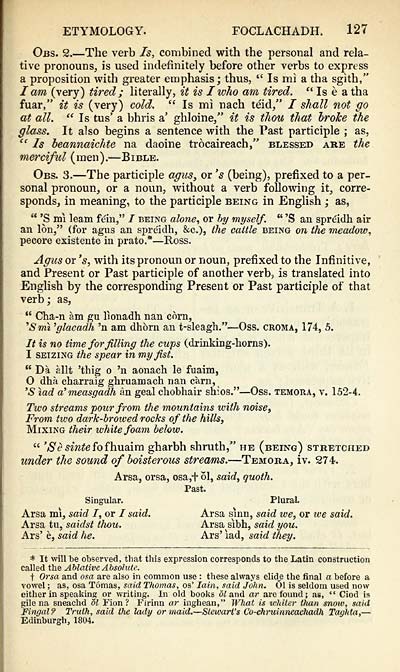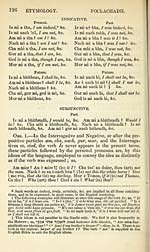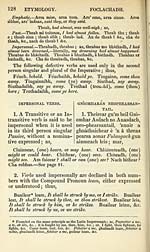Books and other items printed in Gaelic from 1841 to 1870 > Stéidhean a' Ghràmair Ghaëlig
(155) Page 127
Download files
Complete book:
Individual page:
Thumbnail gallery: Grid view | List view

ETYMOLOGY.
FOCLACHADH.
127
Obs. 2. — The verb Is, combined with the personal and rela-
tive pronouns, is used indefinitely before other verbs to express
a proposition with greater emphasis; thus, " Is mì a tha sgìth,"
I am (very) tired ; literally, it is I who am tired. " Is è a tha
fuar," it is (very) cold. " Is mì nach tèid/' I shall not go
at all. " Is tus' a bhris a' ghloine/' it is thou that broke the
glass. It also begins a sentence with the Past participle ; as,
" Is beannaichte na daoine tròcaireach," blessed are the
merciful (men). — Bible.
Obs. 3. — The participle agus, or 's (being), prefixed to a per-
sonal pronoun, or a noun, without a verb following it, corre-
sponds, in meaning, to the participle being in English ; as,
** 'S mì leam fèin," / being àlone, or by rnyself. " 'S an sprèidh air
an lòn," (for agus an sprèidh, &c), the cattle being on the meadow,
pecore existente in prato.*— Ross.
Agus or 's, with itspronoun or noun, prefixed to the Infinitive,
and Present or Past participle of another verb, is translated into
English by the corresponding Present or Past participle of that
verb ; as,
" Cha-n àm gu lìonadh nan còrn,
'Smì 'glacadh 'n am dhòrn an t-sleagh." — Oss. croma, 174, 5.
It is no time forfilling the cups (drinking-horns).
I seizing the spear in my fist.
" Dà àllt 'thig o 'n aonach le fuaim,
dhà charraig ghruamach nan càrn,
S ìad a' measgadh àn geal chobhair shìos." — Oss. temora, v. 152-4.
Two streams pourfrom ihe mountains with noise,
From two dark-browed rocks of the hills,
Mixing their white foam below.
" ' S è sintefofhudiim gharbh shruth," he (being) stretched
under the sound of boisterous streams. — Temora, iv. 274.
* It will be observed, that this expression corresponds to the Latin construction
called the Ablative Absolute.
f Orsa and osa are also in common use : these alvvays elide the final a before a
vowel ; as, osa Tomas, said Thomas, os' Iain, said John. 01 is seldom used now
either in speaking or writing. In old books òl and ar arefound; ag, " Ciod is
gile na sneachd òl Fion ? Fìrinn ar inghean," Wliat is whiter than snow, said
Fingal? Truth, said the lady or maid.—Stewart's C'o-chruinneachadh Taghta,—
Edinburgh, 1804.
Arsa, orsa, osa,t ol, said, quoth.
Past.
Singular.
Plural.
Arsa mì, said I, or / said.
Arsa tu, saidst thou.
Ars' è, said he.
Arsa sìnn, said we, or we said.
Arsa sìbh, said you.
Ars' ìad, said they.
FOCLACHADH.
127
Obs. 2. — The verb Is, combined with the personal and rela-
tive pronouns, is used indefinitely before other verbs to express
a proposition with greater emphasis; thus, " Is mì a tha sgìth,"
I am (very) tired ; literally, it is I who am tired. " Is è a tha
fuar," it is (very) cold. " Is mì nach tèid/' I shall not go
at all. " Is tus' a bhris a' ghloine/' it is thou that broke the
glass. It also begins a sentence with the Past participle ; as,
" Is beannaichte na daoine tròcaireach," blessed are the
merciful (men). — Bible.
Obs. 3. — The participle agus, or 's (being), prefixed to a per-
sonal pronoun, or a noun, without a verb following it, corre-
sponds, in meaning, to the participle being in English ; as,
** 'S mì leam fèin," / being àlone, or by rnyself. " 'S an sprèidh air
an lòn," (for agus an sprèidh, &c), the cattle being on the meadow,
pecore existente in prato.*— Ross.
Agus or 's, with itspronoun or noun, prefixed to the Infinitive,
and Present or Past participle of another verb, is translated into
English by the corresponding Present or Past participle of that
verb ; as,
" Cha-n àm gu lìonadh nan còrn,
'Smì 'glacadh 'n am dhòrn an t-sleagh." — Oss. croma, 174, 5.
It is no time forfilling the cups (drinking-horns).
I seizing the spear in my fist.
" Dà àllt 'thig o 'n aonach le fuaim,
dhà charraig ghruamach nan càrn,
S ìad a' measgadh àn geal chobhair shìos." — Oss. temora, v. 152-4.
Two streams pourfrom ihe mountains with noise,
From two dark-browed rocks of the hills,
Mixing their white foam below.
" ' S è sintefofhudiim gharbh shruth," he (being) stretched
under the sound of boisterous streams. — Temora, iv. 274.
* It will be observed, that this expression corresponds to the Latin construction
called the Ablative Absolute.
f Orsa and osa are also in common use : these alvvays elide the final a before a
vowel ; as, osa Tomas, said Thomas, os' Iain, said John. 01 is seldom used now
either in speaking or writing. In old books òl and ar arefound; ag, " Ciod is
gile na sneachd òl Fion ? Fìrinn ar inghean," Wliat is whiter than snow, said
Fingal? Truth, said the lady or maid.—Stewart's C'o-chruinneachadh Taghta,—
Edinburgh, 1804.
Arsa, orsa, osa,t ol, said, quoth.
Past.
Singular.
Plural.
Arsa mì, said I, or / said.
Arsa tu, saidst thou.
Ars' è, said he.
Arsa sìnn, said we, or we said.
Arsa sìbh, said you.
Ars' ìad, said they.
Set display mode to:
![]() Universal Viewer |
Universal Viewer | ![]() Mirador |
Large image | Transcription
Mirador |
Large image | Transcription
Images and transcriptions on this page, including medium image downloads, may be used under the Creative Commons Attribution 4.0 International Licence unless otherwise stated. ![]()
| Rare items in Gaelic > Books and other items printed in Gaelic from 1841 to 1870 > Stéidhean a' Ghràmair Ghaëlig > (155) Page 127 |
|---|
| Permanent URL | https://digital.nls.uk/101713459 |
|---|
| Description | Out-of-copyright books printed in Gaelic between 1631 and 1900. Also some pamphlets and chapbooks. Includes poetry and songs, religious books such as catechisms and hymns, and different editions of the Bible and the Psalms. Also includes the second book ever published in Gaelic in 1631. |
|---|

